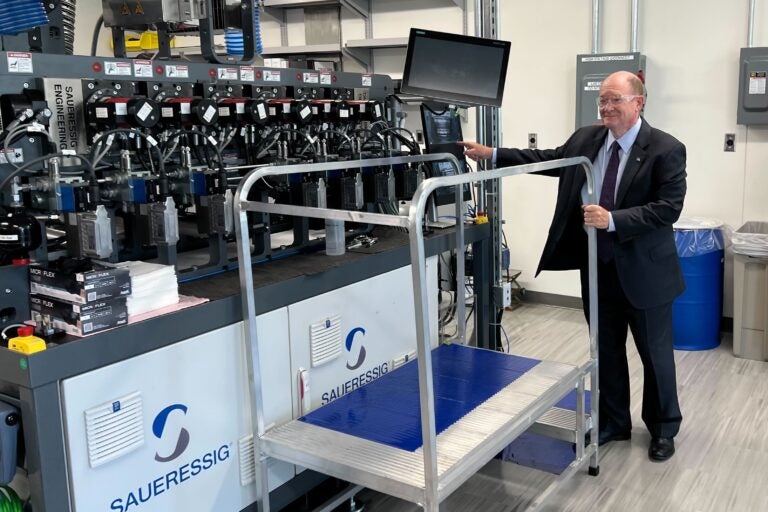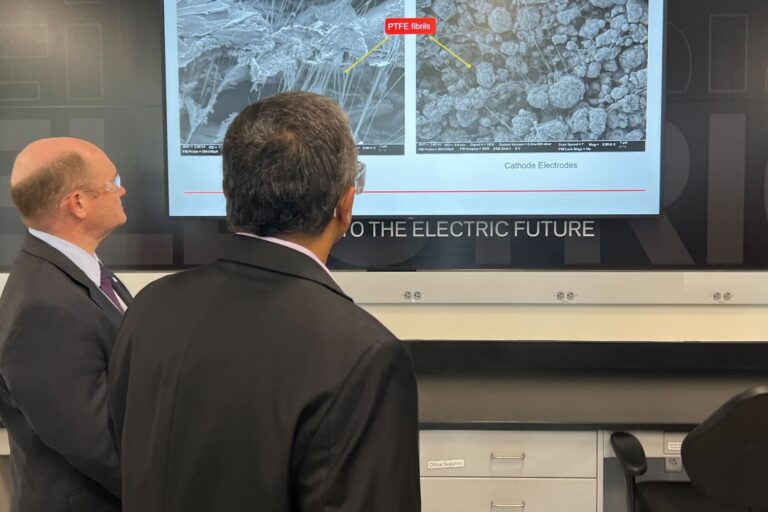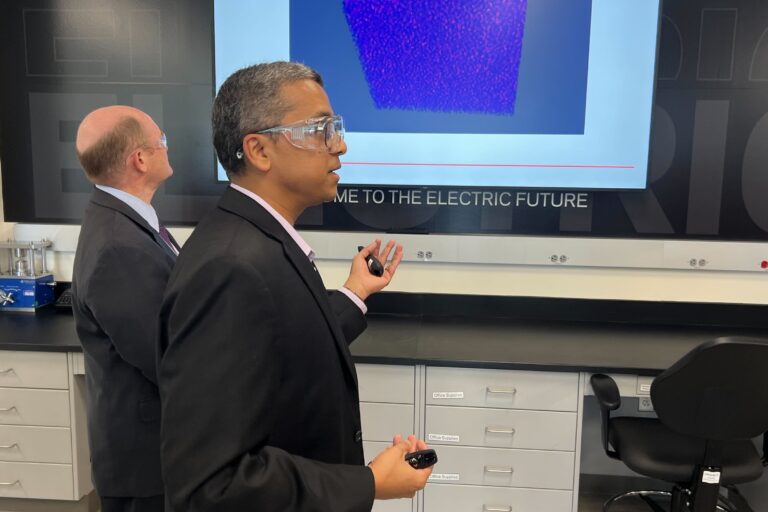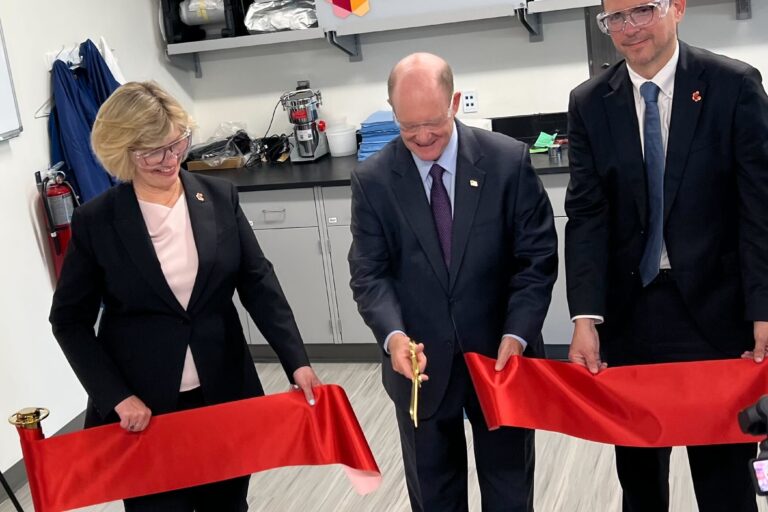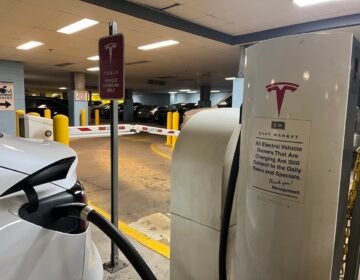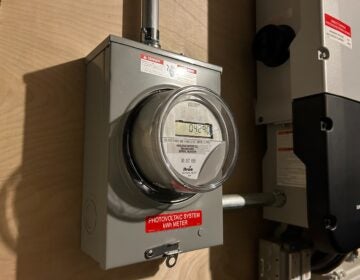Chemours opens new battery materials lab in Newark, Del.
Chemours says its process for producing battery materials reduces cost and energy.
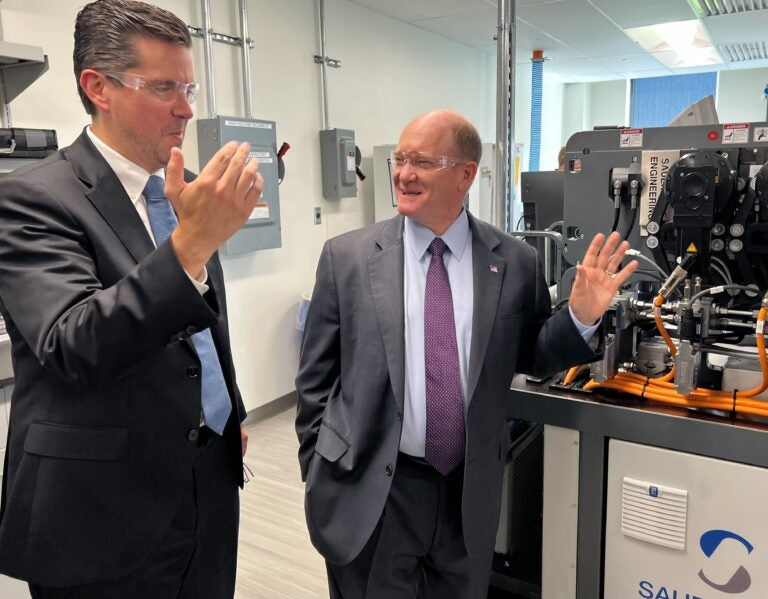
U.S. Sen. Chris Coons joined Delaware elected officials and Chemours leadership for a ribbon cutting for the Battery Innovation Center. The center is a research and development lab where dry electrode coating technology will be produced to scale up production of more sustainable, high-performance lithium-ion batteries for electric vehicles. (Zoë Read/WHYY)
This story is part of the WHYY News Climate Desk, bringing you news and solutions for our changing region.
From the Poconos to the Jersey Shore to the mouth of the Delaware Bay, what do you want to know about climate change? What would you like us to cover? Get in touch.
On Tuesday, Chemours chemical company opened its new multimillion-dollar Battery Innovation Center in Newark, Delaware, where scientists with the DuPont offshoot are creating materials to be used for manufacturing lithium-ion batteries for electric vehicles.
Chemours said its new process for producing materials for electric vehicle (EV) batteries will save money and energy use.
Scientists with the company use a process called “dry electrocoating,” which requires fewer equipment than other conventional processes that require tools to evaporate hazardous solvents. The company said that, in addition to eliminating the use of toxic solvents, the process reduces energy use as well as the cost of manufacturing EV batteries.
The technology also improves battery life, increasing EV mileage by 150 miles, said Stefanie Kopchick, who leads the Chemours’ clean energy venture.
“There’s a lot of things around the materials that we make and how they allow our customers to make batteries more effectively and at a lower cost, so that the electric vehicles themselves can be more broadly adopted. And that will ultimately reduce the carbon footprint of the industry,” she said.
Gas-powered vehicles are a top polluter of fossil fuel emissions that contribute to climate change. There’s a governmental push, including in the form of tax incentives, to increase the use of electric vehicles that can considerably reduce emissions.
However, the cost of manufacturing and purchasing electric vehicles is a significant barrier to transitioning away from traditional cars. According to Kelly Blue Book, the average cost of an electric car was $56,371 in June, compared to $48,644 for gas-powered cars.
“Chemours has a rich history of using our unmatched knowledge of chemistry to develop innovations that help solve our customers’ biggest challenges,” said Denise Dignam, president and chief executive officer at Chemours. “The Chemours Battery Innovation Center is a state-of-the-art lab and an investment in the long-term potential of improving the sustainability footprint and performance of hybrid and electric vehicle batteries.”
However, EV batteries are not without environmental impact. The batteries needed to power electric vehicles contain a group of toxic chemicals known as PFAS, which are linked to serious health problems. PFAS is an abbreviation for perfluoroalkyl and polyfluoroalkyl substances, sometimes also referred to as “forever chemicals” because they do not degrade naturally.
Studies have found battery manufacturing facilities contribute a significant amount of PFAS pollution.
Chemours has a history of contaminating drinking water with the so-called “forever chemicals.” In 2017, the company was found to have contaminated drinking water in North Carolina with the chemicals it used to make Teflon. Today, the company is touting Teflon — a subgroup of PFAS — for battery production.
Chemours said it has reached a 59% global reduction in fluorinated organic chemical emissions, such as PFAS, and aims to reduce it by 99% over the next six years.
WHYY is your source for fact-based, in-depth journalism and information. As a nonprofit organization, we rely on financial support from readers like you. Please give today.



